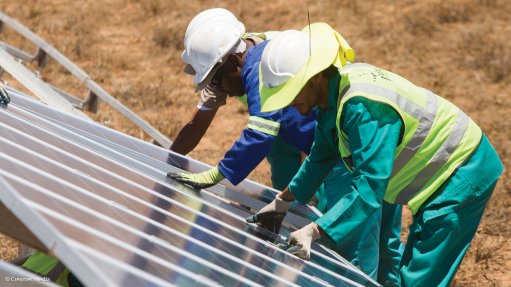Waves of Change Arrive for Eastern Cape with Oceans Economy
This article has been supplied as a media statement and is not written by Creamer Media. It may be available only for a limited time on this website.
Company Announcement - With thousands of kilometres of coastline, South Africa is in a prime position to maximise on its ‘blue gold’, but none so much as the Eastern Cape with two major port cities and two established industrial development zones (IDZ’s) enabling Nelson Mandela Bay and East London to become leading hubs of maritime economic activity. The two industrial manufacturing coastal centres – with first-world components and fully serviced sites – hold several strategic competitive advantages for flagship maritime activities for the oceans economy. Actors in private and state sectors have already made rapid advances to harness locational advantages in the race for South Africa’s oceans economy.
Government’s plans, unveiled earlier this month, aim to address widespread poverty, unemployment and socio-economic inequality by building an operational, turnkey oceans economy. Two decades from now, it is believed that South African maritime-oriented economic activities will contribute an estimated R177 billion to gross domestic product. With this in focus, a thriving maritime sector will shift the Eastern Cape into an era of prosperity. We have 800 kilometres of coastline and the momentum displayed so far by the local private-state nexus shows a strong capacity and desire to further tap the potential of a sector that has largely shaped the history of these two cities. Ports have always been at the forefront of maritime economic organisation, catalysing economic growth through the trade of manufactured goods, commodities and raw materials. As both entry and exit points, the two ports have been critical in the past, present and future of the province and indeed the country.
An important indicator of burgeoning maritime-economy is the Port of Ngqura. Adjacent to the Coega IDZ, the deep-water seaport is becoming the fastest growing terminal in the world, according to Drewry Maritime Research. Seaports have helped transformed underdeveloped regions into important trade centres which in turn supports job creation. Earlier this month, the South African government announced the establishment of a national shipping company in partnership with South Korea. World sea traffic passes by the Eastern Cape on the East-West pendulum trade routes, opening up major opportunities for ship-building and repairs in the region.
The world merchant fleet last year comprised of 106 833 vessels shipping goods and commodities between the continents, including visits to the three ports of the Eastern Cape. During 2013 around 5 944 container ships, vessels and tankers were commissioned for construction by various countries. Is there an opportunity for the Eastern Cape to be a marine industrial centre for shipbuilding and repairs? South Africa’s ship-building industry holds international credibility with activities taking place at shipyards in Cape Town and Richards Bay. However, the Eastern Cape’s world-class industrial manufacturing economy will make the province an excellent contender for future shipbuilding activities in the oceans economy. Existing expertise, skilled labour, logistic services, skills related to the automotive and manufacturing industries and other ancillary services from the manufacturing industrial base will be highly attractive for domestic and foreign direct investment.
But there’s more that can be done. Industrial clustering for mobility industries (air, sea and land) is an accepted form of economic organisation across the world. While Nelson Mandela Bay and East London dominate automotive manufacturing, the expertise of the industrial base should not only be extended for the ship building industries but need to be extended further.
Regional economic growth can be further augmented by aeronautical components manufacturing. The ‘sky economy’ is a unique opportunity for the province in addition to an oceans economy. An opportunity exists for us to become Africa’s mobility manufacturing industrial zone. Actors in state and private sector should explore this concept considering the interrelatedness of industry.
The focus on the oceans economy is in response to a number of critical challenges including global food security issues, and the need to stimulate much needed local job creation. Marine food resources are depleting at devastating rates. Between 60 and 70 per cent of the world’s fish species are exhausted. And, with one out of every five individuals on this planet relying on ocean food as sources of protein, we are on the brink of food security crisis.
Earlier this year the Coega Development Corporation (CDC) announced plans to address global food security while unlocking 5 000 local job creation opportunities, through envisaged R2-billion (US$ 200 million) aqua-farming facility for marine animals and plants such as finfish, abalone and seaweed on 300 hectares in the Coega IDZ.
We should also laud the work of local university to provide the research and development platform for an oceans economy.
Nelson Mandela Metropolitan University (NMMU) in Port Elizabeth will be playing a critical role in knowledge generation for maritime and marine industries. The university formalised ties with the UN-endorsed World Maritime University (WMU) in Sweden last year.
NMMU is already making critical research contributions that will enhance the competitiveness of the region in environmental sustainable ways. Last year in November, several African countries attended NMMU’s African Maritime Domain Conference to develop responsible governance policies.
Another aspect to building an oceans economy is marine tourism.
There is a unique opportunity for the Eastern Cape Parks and Tourism Agency, Eastern Cape Department of Economic Development, Environmental Affairs and Tourism and other state and private sector actors to innovate and promote the province through cruise vacations with extended land excursions. Data released this year shows that the demand for the ocean cruises increased with 77 per cent over the decade. The majority are 11 million American and next is European passengers.
Our province is one of the most diverse and spectacular tourism destinations in South Africa, including rich cultural diversity, Big Five game reserves, stunning landscapes and of course a beautiful coastline with blue-flag beaches. We are also home to one of the first-ever Big Seven game reserves – the Addo Elephant National Park –which integrates the Big Five with the marine life, to include the Great White shark and Southern Right whale.
Also Port Elizabeth is positioned as the country’s water sports capital, home to major water sports event including the only international Ironman event on the African continent.
We – or tour operators – should consider further partnering with cruise line operators and ground handlers to build on the current tourism offerings. It is an opportunity that has not yet been fully maximised to increase the much needed tourism spend in the Eastern Cape.
There are many signs that we are on the right track. Nelson Mandela Bay and East London should be united in ensuring we are key role-players and benefactors of the oceans economy. It is especially necessary because poverty in the Eastern Cape remains widespread, deep and intergenerational in relation to other coastal provinces.
Comments
Announcements
What's On
Subscribe to improve your user experience...
Option 1 (equivalent of R125 a month):
Receive a weekly copy of Creamer Media's Engineering News & Mining Weekly magazine
(print copy for those in South Africa and e-magazine for those outside of South Africa)
Receive daily email newsletters
Access to full search results
Access archive of magazine back copies
Access to Projects in Progress
Access to ONE Research Report of your choice in PDF format
Option 2 (equivalent of R375 a month):
All benefits from Option 1
PLUS
Access to Creamer Media's Research Channel Africa for ALL Research Reports, in PDF format, on various industrial and mining sectors
including Electricity; Water; Energy Transition; Hydrogen; Roads, Rail and Ports; Coal; Gold; Platinum; Battery Metals; etc.
Already a subscriber?
Forgotten your password?
Receive weekly copy of Creamer Media's Engineering News & Mining Weekly magazine (print copy for those in South Africa and e-magazine for those outside of South Africa)
➕
Recieve daily email newsletters
➕
Access to full search results
➕
Access archive of magazine back copies
➕
Access to Projects in Progress
➕
Access to ONE Research Report of your choice in PDF format
RESEARCH CHANNEL AFRICA
R4500 (equivalent of R375 a month)
SUBSCRIBEAll benefits from Option 1
➕
Access to Creamer Media's Research Channel Africa for ALL Research Reports on various industrial and mining sectors, in PDF format, including on:
Electricity
➕
Water
➕
Energy Transition
➕
Hydrogen
➕
Roads, Rail and Ports
➕
Coal
➕
Gold
➕
Platinum
➕
Battery Metals
➕
etc.
Receive all benefits from Option 1 or Option 2 delivered to numerous people at your company
➕
Multiple User names and Passwords for simultaneous log-ins
➕
Intranet integration access to all in your organisation


















